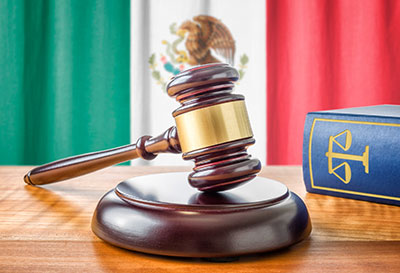Mexico’s President-elect Andres Manuel Lopez Obrador (often abbreviated as AMLO) has promised to invest around 175 billion pesos ($9.4 billion) into his nation’s state-owned energy enterprise, Pemex. Whether this means he will increase cooperation with foreign-operated companies or further nationalize his nation’s hydrocarbon resources remains to be seen.
Oil production from offshore Mexico has declined over the last decade, but deep-water reserves in the southern Gulf of Mexico hold great potential. In fact, the EIA says that, overall, Mexico holds at least 10 billion barrels of proven crude oil reserves.
 In 2013-14, President Enrique Pena Nieto and the Mexican legislature put oil industry reforms into law that allowed foreign and private investment in Mexico’s oil and gas industry for the first time in 75 years. Under those reforms, the Mexican government receives a 74 percent take on any new barrels. Considering the more than $220 billion invested by the international oil industry since then, and the $160 billion in future investment expected as a result of the 107 contracts already awarded for oil and gas exploration, substantial revision of those reforms could rattle markets.
In 2013-14, President Enrique Pena Nieto and the Mexican legislature put oil industry reforms into law that allowed foreign and private investment in Mexico’s oil and gas industry for the first time in 75 years. Under those reforms, the Mexican government receives a 74 percent take on any new barrels. Considering the more than $220 billion invested by the international oil industry since then, and the $160 billion in future investment expected as a result of the 107 contracts already awarded for oil and gas exploration, substantial revision of those reforms could rattle markets.
Elected in July 2018, AMLO has repeatedly said that he wants to increase national content on upstream contracts. Just how he will accomplish this after his December inauguration on remains to be seen, but he does have the public’s confidence. He won the election in a landslide and his party won a coalition majority in both chambers of congress, as well as 5 out of 9 state governorships, and a majority of state-level legislatures. According to the Wilson Center’s Mexico Institute, this gives AMLO the most legislative leverage of any leader in Mexico’s modern democratic era.
With all this legislative muscle, could AMLO rewrite the rules?
 The 2013-14 reforms put into law the legal framework that has enabled Pemex to grow in its balance sheets, even if the full benefits have yet to trickle down to the voting populace. Under those reforms, Mexico retains ownership of hydrocarbons in the subsurface, but competition is opened for exploration and production, downstream, midstream, and energy production. The reforms also increased transparency and accountability, while promoting environmental sustainability.
The 2013-14 reforms put into law the legal framework that has enabled Pemex to grow in its balance sheets, even if the full benefits have yet to trickle down to the voting populace. Under those reforms, Mexico retains ownership of hydrocarbons in the subsurface, but competition is opened for exploration and production, downstream, midstream, and energy production. The reforms also increased transparency and accountability, while promoting environmental sustainability.
However, while campaigning, the left-leaning AMLO repeatedly stated that the reforms need an overhaul due to widespread corruption, and that his administration would implement a more nationalistic hydrocarbons policy. For example, in his post-election victory speech, AMLO said that his administration would audit oil contracts for graft and corruption going back to 2015 and that they ask the Mexican congress and courts to pursue and prosecute offenders. He also threatened to suspend or cancel Mexico’s oil bid rounds.
Other reasons for concern could include questions around who controls recently discovered offshore reserves in places previously thought to be played out.
For example, Pemex plans to drill a test well later this year in the Zama reservoir, a Talos-led discovery that they claim could overlap with a neighboring block controlled by Pemex. The oil in place for Zama is expected to be between 1.4 and 2 billion barrels of oil equivalent.
The Sureste Basin, where the shallow-water Zama reservoir exists, reportedly emerged as a surprise to Pemex. It even garnered Talos the “Discovery of the Year 2017” award during WoodMackenzie’s (WoodMac) annual exploration awards ceremony in June 2018. Talos' partners in the discovery are Premier Oil and Sierra Oil & Gas.
“Zama is a big find in a new play and looks set to be a company-maker,” noted WoodMac in announcing the award. “It is also one of the first foreign-operated discoveries in Mexico since international oil companies returned to the country after an absence of over 70 years.”
Such discoveries prove that the expertise and technology of foreign-operated companies can find major reserves even in shallow-water areas where Pemex has explored extensively. Could the bids that made such discoveries possible be included in the audits on which AMLO based some of his nationalist rhetoric. Would AMLO dare challenge the contracts for discoveries like Zama discovery (or Eni’s 1 billion-barrel Amoca prospect in the same basin)? Most observers say that AMLO is unlikely to challenge sealed contracts, which partly explains aggressive bidding by companies like Total, Shell, Eni and DEA on eight blocks of the Sureste Basin offered up in March 2018.
Talos says they are closing in on approval from Mexico’s National Hydrocarbons Commission for testing, coring and sampling in the reservoir. In July, the company sought approval from Mexico’s Ministry of Energy (SENER) to enter a preliminary agreement with PEMEX for a potential unitization encompassing the Zama field in block 7 and the PEMEX grant to the east. Talos says that the agreement would clear the way for development, with first production from the field set for 2022. Meanwhile, Eni has announced the Commission’s approval of their development plan for Amoca, Miztón and Tecoalli, all located in the shallow waters of the Campeche Bay.
However, the Commission has delayed auction awards scheduled for September 2018 until February 2019 so that the incoming administration can review and potentially revise contracts. This has raised a good many questions about what these audits entail, since the contracting process was transparent by international standards.
This delay comes on the heels of Pemex filing complaints in July 2018 against individuals they say posed as company officials in order to obtain fraudulent contracts, an issue that reminds some of pre-reform fraud, wherein billions of dollars of deals granted by the state oil conglomerate were revealed to be corrupt. AMLO also plans to appoint his top campaign energy advisor, Rocio Nahle as Mexico’s energy minister. Nahle is said to favor a more nationalistic approach to energy policy, as does AMLO’s choice to run Pemex, Octavio Romero Oropeza.
Will revenue outweigh election rhetoric?
 Whatever AMLO and his powerful coalition does in terms oil reserves will be watched closely by foreign investors and global markets. If he voids any of the previous reforms, or cancels contracts already signed by his administration’s predecessors without an obvious consensus, investment volatility could follow.
Whatever AMLO and his powerful coalition does in terms oil reserves will be watched closely by foreign investors and global markets. If he voids any of the previous reforms, or cancels contracts already signed by his administration’s predecessors without an obvious consensus, investment volatility could follow.
However, recent analysis from Duncan Wood, Director of the Wilson Center’s Mexico Institute, suggests that such drastic action is unlikely, due to the fact that many of the contracts and investments made between 2014 and now are expected to begin paying dividends in terms of increased oil production by 2021. The resulting fiscal revenue will be key to accomplishing some of AMLO’s other campaign promises, from building refineries to balancing the budget.
Since the election, AMLO’s incoming chief of staff, Alfonso Romo, has sought to temper nervousness from international investors by promising that that the new administration would not try to overhaul 2014 reform laws, and that private investments would not be hurt.
"Mexico has a necessity for lots of money for offshore drilling,” Romo told Bloomberg in early July. If oil output returns and drives growth "no one will fight success."
By Greg Leatherman, ON&T Editor in Chief
Selected Resources:
National Hydrocarbons Commission Information Center


